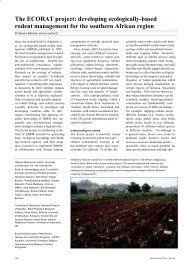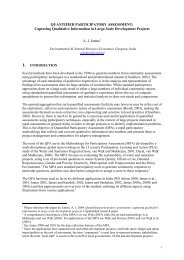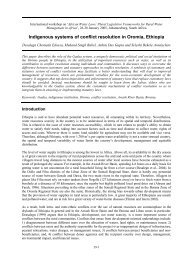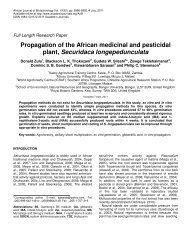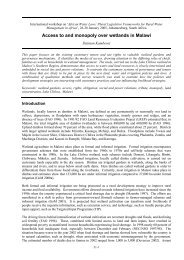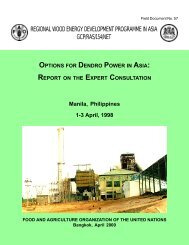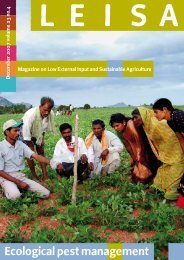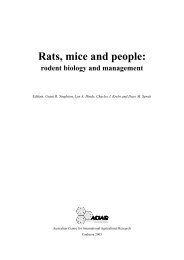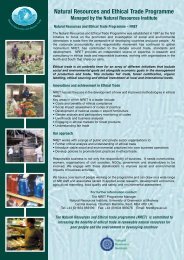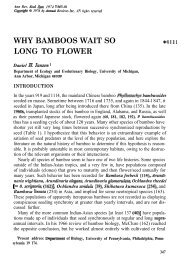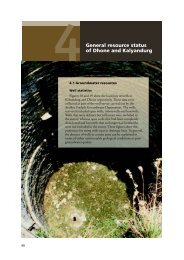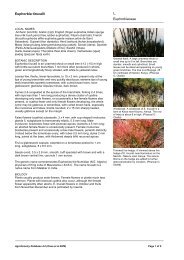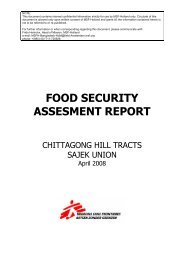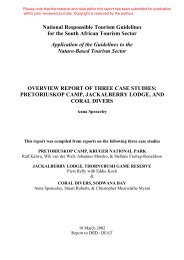Access to Rural Non-Farm Livelihoods - Natural Resources Institute
Access to Rural Non-Farm Livelihoods - Natural Resources Institute
Access to Rural Non-Farm Livelihoods - Natural Resources Institute
Create successful ePaper yourself
Turn your PDF publications into a flip-book with our unique Google optimized e-Paper software.
5.5.1 Poverty<br />
Poverty in its most basic sense encompasses or is related <strong>to</strong> several of the barriers cited<br />
above. It is most obvious when considering a lack of start up capital, but is also the reason<br />
that more of the proceeds are not reinvested in existing IGAs <strong>to</strong> allow them <strong>to</strong> expand and<br />
become more profitable, or evolve in<strong>to</strong> new, more profitable IGAs. It is also related <strong>to</strong> low<br />
levels of consumption and limited local markets, as well as farmers’ inability <strong>to</strong> set aside<br />
money for the off seasons, or <strong>to</strong> see them through hard times, as well as some of the problems<br />
that suppliers of goods and services have with cus<strong>to</strong>mers not repaying credit.<br />
In the primarily agricultural environment of the village, problems with farming are either a<br />
result of poverty (inability <strong>to</strong> buy appropriate or sufficient inputs <strong>to</strong> produce acceptable<br />
yields), or a cause of poverty (poor weather causing poor yields and hence reduced incomes,<br />
or even food security problems), or both (the incidence of pests which farmers cannot afford<br />
<strong>to</strong> adequately control with chemicals, and which thus reduce yields). Problems in farming<br />
and with farming incomes then affect other non-farm IGAs through reducing the availability<br />
of start-up capital, causing more of the proceeds <strong>to</strong> be used <strong>to</strong> cover household expenses<br />
instead of being reinvested, or even causing assets <strong>to</strong> be liquidated.<br />
Working in groups allows for pooling of capital <strong>to</strong> get started, and also encourages regular<br />
reinvestment of working capital at least, if not expansion capital. However, successful groups<br />
are not only characterised by trust, but also by the fact that they exclude the poorest who are<br />
unable <strong>to</strong> meet the investment/membership criteria.<br />
Finally, poverty is also at the root of many people’s inability <strong>to</strong> take their products <strong>to</strong> the best<br />
markets, or unwillingness <strong>to</strong> take the risk that money spent on transport might not be worth it.<br />
5.5.2 Education and training<br />
In contrast <strong>to</strong> Byakabanda, which was home <strong>to</strong> numerous salaried employees, typically with<br />
good secondary level education 119 , none were encountered in Kitambuza. Data are few, but<br />
there was no clear pattern between participation in non-farm IGAs and education – of those<br />
who attended the various community meetings, there were farmers with educational levels<br />
ranging from no formal education <strong>to</strong> S6, while those involved in non-farm IGAs, such as<br />
trading, were typically in the middle of the range with some primary schooling though not<br />
necessarily the full seven years. However, the importance that most people, including those<br />
who are not well educated themselves, place on education for their children indicates that it is<br />
widely perceived <strong>to</strong> be important in getting on in life.<br />
Lack of skills was perceived <strong>to</strong> cover a range, from specialist or new skills, such as jam<br />
making, <strong>to</strong> very basic skills, particularly amongst older women (widows), typically with no<br />
or little formal education 120 . Few people, if any, keep books, which is particularly a problem<br />
119 See section 8.<br />
120<br />
“It’s the only thing I can imagine doing; everything else is impossible.”<br />
Mrs Juliet Bikianyisha, a 70 year old widow with no formal education, on why she would be choose <strong>to</strong> make<br />
baskets and mats as opposed <strong>to</strong> another IGA. 12/10/2000<br />
“I’m <strong>to</strong>o old. I’ll just consume any capital. I have no experience.”<br />
Mrs Mebko Mosi, a 51 year old widow, with three years of schooling, on why she does not want <strong>to</strong> start an<br />
IGA. When asked if she thought training was a good idea, she said that she’d like training in anything, but was<br />
unable <strong>to</strong> name or actually imagine any specific area. 12/10/2000<br />
58



